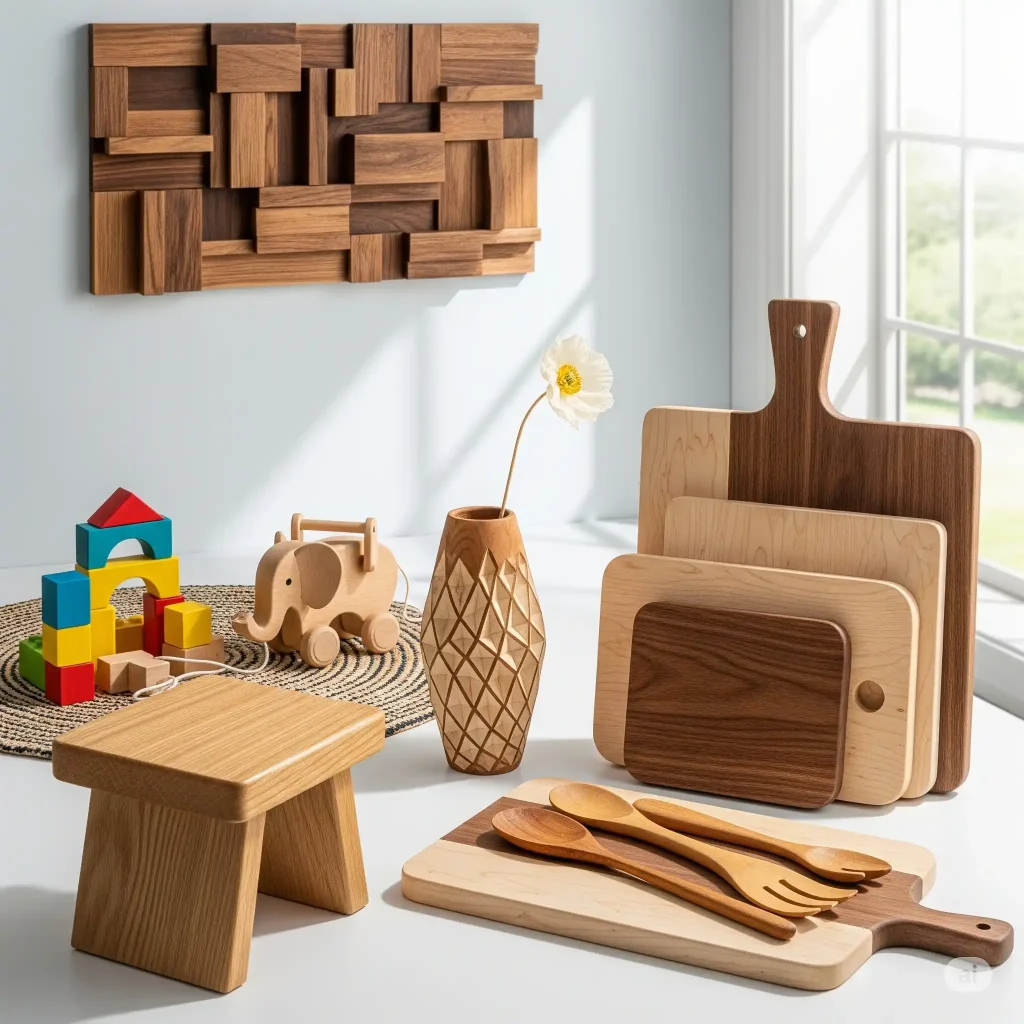The aroma from freshly cut lumber, pulsing machine hum and the joy of making something tangible using your own hands are only a few examples of the reasons why woodworking is so appealing. No matter if you’re an experienced carpenter or a skilled enthusiast who wants to make your passion a profits this article will go over different business opportunities in woodworking and provide you with the motivation and direction to map your own path to the top in this timeless trade.
Introduction: The Enduring Appeal of Woodworking
In the age of disposable, mass-produced goods hand-crafted wooden objects have an appeal and value that is unique. Customers are increasingly seeking out items with character, quality and stories that explains their origins. This increasing appreciation for top-quality craftsmanship provides a perfect opportunity for woodworking companies to grow. Furthermore, the versatility that wood can offer as a building material permits a broad range of products, ranging from functional furniture and exquisite decoration to personalized gifts and structural components. This article will explore diverse niche ideas in the woodworking field, and provide concrete advice on how you can make your woodworking talents into a long-lasting and profitable business opportunity.

Sowing the Seeds of Success: Identifying Profitable Niches
Before you begin cutting the first piece of wood to sell, you must to determine a profitable niche in the woodworking market. Take into consideration your abilities as well as your interests, resources available as well as your local market demand.
Custom Furniture
One evergreen woodworking business idea is creating custom furniture. Many people seek unique, top-quality furniture pieces that are designed to meet their particular preferences and needs. You may specialize in specific designs (e.g. classical Bengali furniture, contemporary minimalist designs or furniture made of wood) or offer a wide selection. Your offerings can include design consultation, guidance on selecting the right material as well as delivery and installation. Additionally, focusing on sustainability and locally-sourced wood could be a major selling aspect.
Read More: List of Profitable Business Ideas in Wood and Wood Products Manufacturing Industry.
home decor and accessories
A different avenue that is promising would be the creation of hand-crafted furniture items and accessories for the home. This could include decor bowls for walls candles frame frames for pictures, as well as personalized signs. These are usually less expensive in manufacturing costs as well as appeal to a larger audience seeking to add a bit of handmade elegance for their living spaces. Explore traditional Bengali patterns and using them in your designs is a great way to connect with local markets.
Kitchenware and Serving Utensils
Affordable and attractive the wooden serving tools and kitchenware are constantly sought-after. Think about making cutting tables, serving plates salad bowls, coasters, and wooden spoons. Concentrating on high-quality, food-safe finishes and sturdy woods will ensure the long-term durability and security of your items. Participating in local market as well as fairs held in your nearby area can be an great way to display and sell these products.
Educational and Children’s Toys Things
Wooden toys are very popular with parents looking for robust environmentally-friendly, safe alternative to toys made of plastic. They can be specialized in classic toys like puzzles, blocks as well as educational items. Making toys that encourage the development of children’s minds and skills is a powerful selling point. Make sure that you meet safety requirements for toys for children.
Read Our Project Report: Click Here
The Outdoor and Garden Furniture
With many homes having outdoor spaces There’s a demand for garden furniture made of wood (benches and planters) and birdhouses, trellises as well as other outdoor decor products. The use of weatherproof wooden materials and finishes is vital to ensure the durability of these items.
Specialty items and personalized Presents and Gift
Find niche market for personalized items, such as making custom gift items (engraved cutting board, personalized name signs) pet toys (wooden bedding, bowls for feeding) or musical instrument parts. The ability to customize your items can attract premium prices.
Repurposing and upcycling
With the increasing importance on sustainable woodworking, a company that focuses on upcycling and repurposing old wood into brand new and original items is sure to draw eco-conscious customers. It could mean transforming old furniture into new pieces or creating decorative items made of reclaimed wood.
Selecting Your Niche
Be sure to evaluate your expertise and the local market demand and the competition in these niches prior to deciding on the best area you should focus your efforts.
Read More: MSME Business Ideas by Government: Unlocking India’s Startup Revolution
Setting Up Shop: Essential Tools and Equipment
After you’ve found your niche then you’ll have to acquire the required equipment and tools. The tools you need will be dependent on the type of woodworking that you want to undertake, but important items are:
- The most basic hand tools: hand saws planes, hammers, chisels, measuring tapes, screwdrivers, squares.
- Power Tools: Table saw, miter saw, drill press, sanders (orbital, belt), router.
- Protection Equipment for Safety: Glasses of safety, dust masks, hearing protection and gloves.
- Fasteners and clamps: Various types and sizes of clamps and screws.
- Finishing Materials: Sandpaper (various grits) and varnishes, stains and equipment for spraying (optional).
Start with a simple set of tools, and then gradually increase your arsenal as your company expands and your needs change. Think about purchasing a quality used tool to cut down on the initial cost. Set up a work space at your residence or renting a space is also crucial. Make sure you have that you have adequate ventilation and dust collection to ensure a safe and healthy work environment.

Crafting Your Brand: Marketing and Sales Strategies
To turn your woodworking projects into a lucrative business it is essential to have successful sales and marketing strategies specifically designed for market trends in the market.
- Create a Brand Image: Create a unique brand name logo, logo, and visual design that speaks to the craftsmanship and quality in your job.
- Create an online presence: In today’s digital age having an internet presence has become vital. Make a professional-looking web page or make use of the social networks (Facebook, Instagram) to present your services, communicate your processes, and connect with potential clients. Quality photos of your work are vital.
- Participate in local Markets and Fairs: Local craft fairs and markets where you can put up a stand to exhibit and sell your woodworking products directly to buyers. This is a great chance to interact with customers face-to-face and for establishing connections.
- Network with local businesses: Collaborate with interior designer, home decor stores and gift shops to showcase your items or offer wholesale alternatives.
- Provide Custom-Orders: Give personalized services through taking orders that are custom. This lets you satisfy the needs of specific customers and usually comes with higher costs. It is important to clearly define the process you will follow in order to create custom items, which includes the design consultation, timelines and the payment conditions.
- Word-of-Mouth Marketing: Help satisfied customers share the news about your business. Positive reviews and positive recommendations are powerful tools for marketing.
- Think about E-commerce Platforms: Explore selling your products on online marketplaces that focus on handcrafted products.
- Pricing Strategies: Decide your prices in relation to your materials costs as well as your labor and overhead costs, and the value you perceive to the items you hand-make. Find out the prices of competitors.
Read More: Low Investment Business Ideas in West Bengal Under 10 Lakhs
Ensuring Success: Operations and Customer Satisfaction
Effective operations and a focus at customer delight are essential to the longevity that your company’s woodworking operation will enjoy.
- Improve Your Production Process: Optimize your workflow to reduce waste and increase efficiency. Look into batch processing for your most-loved products.
- Source High-Quality Material: Establish reliable relationships with local lumber companies who offer quality lumber at affordable costs. Find sustainable sources of sourcing.
- Management of Inventory effectively: Keep track of your lumber inventory as well as your hardware inventory and final products.
- Deliver excellent customer service: Be responsive to questions, clearly communicate with customers regarding their orders and address any issues quickly and professionally.
- Assure Quality Control: Maintain high standards of craftsmanship throughout your products. Be attentive to the details in every step starting from assembly and cutting to final.
- packaging and delivery: Pack your items carefully to avoid damage during transportation. Give reliable delivery options for customers.
Read Our Book: Click Here
Scaling Your Craft: Growth and Expansion
After your woodworking company is established is established and profitable, you can look into different strategies for growth and expansion.
- Increase Your Product Range: Introduce new products that will complement your existing offerings.
- Find Apprentices or Assistants: As demand for your work grows, you should consider hiring experienced assistants to assist with the production.
- Spend money on more Advanced Equipment: Upgrading your tools can boost efficiency and enable you to tackle more complex or larger projects.
- Open a Workshop, or showroom: The presence of a physical location can increase your professionalism as well as enhance the experience for customers.
- Collaboration with Other Artists: Partnering with other local craftspeople will expand your market and provide customers with a an array of exclusive items.
- Find Export Opportunity: When your goods have more appeal to the masses you might consider selling to the markets.
Discover the Right Business for You With Our Startup Selector Tool
Conclusion
The woodworking business industry presents a wealth of opportunities for experienced and enthusiastic people. If you can identify a lucrative niche by investing in the best equipment, developing a strong brand, and emphasizing customer satisfaction, you will be able to create a profitable and lucrative woodworking business. The timeless appeal of hand-crafted wooden products, paired with a spirited entrepreneurial spirit can turn sawdust and expertise into enduring prosperity in the heart of West Bengal.
Woodworking Business Ideas: Frequently Asked Questions (FAQ)
1. What are the first expenses involved in the beginning of a woodworking company?
Start-up costs vary widely based on the size of your venture and the kind of woodworking that you want to carry out. This includes the costs of equipment, tools such as workspaces, workspaces, initial materials purchases, and marketing costs.
2. Where can I find high-quality timber in and in the vicinity?
Research local sawmills, lumberyards, as well as timber traders. Establishing relationships with trustworthy suppliers is vital to guarantee prices and material quality. Explore sustainable wood-sourcing alternatives.
3. What are the registration and licensing requirements for a woodworking company?
You will likely need to get an overall business license as well as perhaps register your business with the government as an MSME (Micro Small, medium, and Large Enterprise) to receive government benefits. Check out the specific regulations for West Bengal and consult with the local authorities.
4. What should I charge for my wood-crafted products?
Take into consideration your materials costs, time spent on labor (including design, production and finishing) and overhead expenses (rent utilities marketing) and a fair profit margin. Find out the prices of similar handmade items on market.
5. What precautions do I need to take in the course of running a woodworking business?
Safety is your first priority. Always wear the proper personal protection equipment (safety glasses or hearing protection, dust shield). Check that your equipment is in good condition and follow the instructions of the manufacturer. Keep your workspace clean and tidy. work area.






